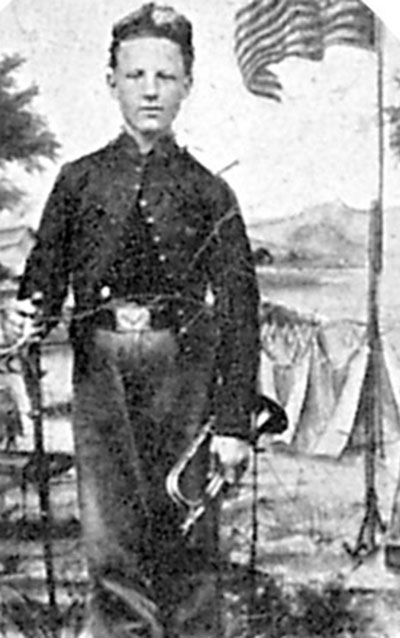Much has been written about the movements of armies and the actions of leaders during the Civil War. A less explored topic, but equally as important, is how the war affected the lives of young people. An entire generation was shaped by their perception of events during this critical time in American history. Forces beyond their control impacted their homes, their families, and even their health. Though some became victims of the war, lost to disease, starvation, or violence, others used their experiences to reform the country born out of the ashes of our nation's darkest days.
"The sight of hundreds of prostrate men with serious wounds of every description was appaling. Many to relieve their suffering were impatient for their turn upon the amputation tables, around which were pyramids of severed legs and arms" Sixteen-year-old Edward W. Spangler 130th Pennsylvania at Antietam
Boys in the Service

Many children spent the war worried about relatives and friends who were fighting far away. Some felt the effects of the war in their stomachs, as food supplies dwindled. Some boys lied about their ages and went off to fight. Those not killed or wounded became scarred nonetheless, as their young eyes witnessed the horrors of war.
Most of the boys who joined the army were assigned less dangerous positions, such as bugler or drummer boy. These jobs were important because their instruments were used as calls and signals for the troops. Still, in large battles, there was no place to hide. Charley King was one of the youngest soldiers killed in the war. He was only thirteen when he died at the Battle of Antietam.
Johnny Cook enlisted as a bugler with Battery B, 4th United States Artillery in 1862. During the Maryland Campaign, fifteen-year-old Johnny served as a messenger. At the Battle of Antietam, Johnny and his unit came under heavy fire from Confederate soldiers along the Hagerstown Pike near the infamous "Cornfield." When Johnny returned from helping his wounded commander to safety, he discovered that the soldiers serving on the cannon had been killed. Johnny began to load the cannon by himself until Gen. John Gibbon rode by, saw what was happening, jumped off his horse, and began to help the brave young cannoneer.
The Confederate soldiers came dangerously close, but Johnny and Gen. Gibbon were able to man the cannon and push them back towards the West Woods. For his bravery at Antietam, Johnny Cook became one of the youngest soldiers ever to receive the Medal of Honor. His official Medal of Honor citation reads: "Volunteered at the age of 15 years to act as a cannoneer, and as such volunteer served a gun under a terrific fire of the enemy." Johnny went on to serve at Gettysburg and several other battles. After the war, he moved back to his hometown of Cincinnati, Ohio. He died in 1915 and is buried in Arlington National Cemetery.
Part of a series of articles titled No Time for Games.
Next: Through Their Eyes
Last updated: August 14, 2017
